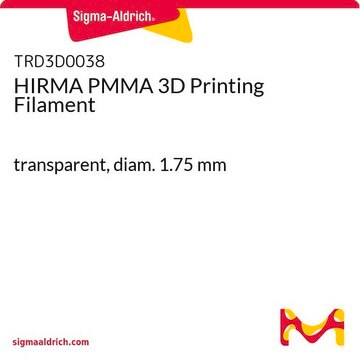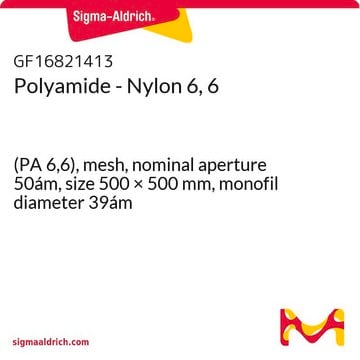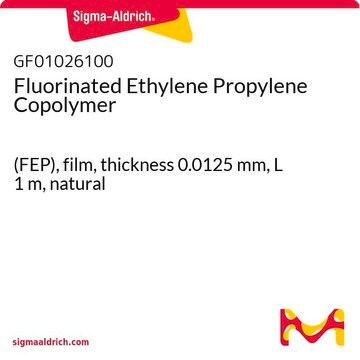Wszystkie zdjęcia(2)
Key Documents
GF38405549
Aluminum
wire reel, 1m, diameter 0.25mm, hard, 99.99+%
Synonim(y):
Aluminum, AL005160
Zaloguj sięWyświetlanie cen organizacyjnych i kontraktowych
About This Item
Wzór empiryczny (zapis Hilla):
Al
Numer CAS:
Masa cząsteczkowa:
26.98
Numer MDL:
Kod UNSPSC:
12141702
Identyfikator substancji w PubChem:
NACRES:
NA.23
Polecane produkty
Próba
99.99%
Postać
wire
temp. samozapłonu
1400 °F
producent / nazwa handlowa
Goodfellow 384-055-49
rezystywność
2.6548 μΩ-cm
dł. × śr.
1 m × 0.25 mm
tw
2460 °C (lit.)
mp
660.37 °C (lit.)
gęstość
2.7 g/mL at 25 °C (lit.)
ciąg SMILES
[Al]
InChI
1S/Al
Klucz InChI
XAGFODPZIPBFFR-UHFFFAOYSA-N
Opis ogólny
For updated SDS information please visit www.goodfellow.com.
Informacje prawne
Product of Goodfellow
This page may contain text that has been machine translated.
Kod klasy składowania
13 - Non Combustible Solids
Klasa zagrożenia wodnego (WGK)
WGK 3
Temperatura zapłonu (°F)
Not applicable
Temperatura zapłonu (°C)
Not applicable
Certyfikaty analizy (CoA)
Poszukaj Certyfikaty analizy (CoA), wpisując numer partii/serii produktów. Numery serii i partii można znaleźć na etykiecie produktu po słowach „seria” lub „partia”.
Masz już ten produkt?
Dokumenty związane z niedawno zakupionymi produktami zostały zamieszczone w Bibliotece dokumentów.
Ryan J Mailloux et al.
Experimental cell research, 317(16), 2231-2238 (2011-07-27)
Aluminum (Al) is a metal toxin that has been implicated in the etiology of a number of diseases including Alzheimer's, Parkinson's, dialysis encephalopathy, and osteomalacia. Al has been shown to exert its effects by disrupting lipid membrane fluidity, perturbing iron
Todd D Terhune et al.
Journal of immunotoxicology, 10(2), 210-222 (2012-09-13)
Aluminum-containing adjuvants increase the effectiveness of vaccination, but their ability to augment immune responsiveness also carries the risk of eliciting non-target responses, especially in genetically susceptible individuals. This study reviews the relevant actions of aluminum adjuvants and sources of genetic
J R Walton
Journal of Alzheimer's disease : JAD, 29(2), 255-273 (2012-02-15)
Most humans living in industrialized societies are routinely exposed to bioavailable aluminum salts in the form of additives-in commercially-prepared foods, alum-clarified drinking water, certain pharmaceuticals, sunscreens, and other topical applications. Minute amounts of this aluminum are absorbed into the circulation.
Simone Vecchi et al.
Journal of pharmaceutical sciences, 101(1), 17-20 (2011-09-16)
Aluminum (Al) salt-based adjuvants are present in a large variety of licensed vaccines and their use is widely considered for formulations in clinical trials. Although the regulatory agencies have clearly stated the acceptable levels of Al salts in vaccines for
Sungwon Han et al.
Cell biology and toxicology, 29(2), 75-84 (2013-03-07)
Metal pollutants are a global health risk due to their ability to contribute to a variety of diseases. Aluminum (Al), a ubiquitous environmental contaminant is implicated in anemia, osteomalacia, hepatic disorder, and neurological disorder. In this review, we outline how
Nasz zespół naukowców ma doświadczenie we wszystkich obszarach badań, w tym w naukach przyrodniczych, materiałoznawstwie, syntezie chemicznej, chromatografii, analityce i wielu innych dziedzinach.
Skontaktuj się z zespołem ds. pomocy technicznej







